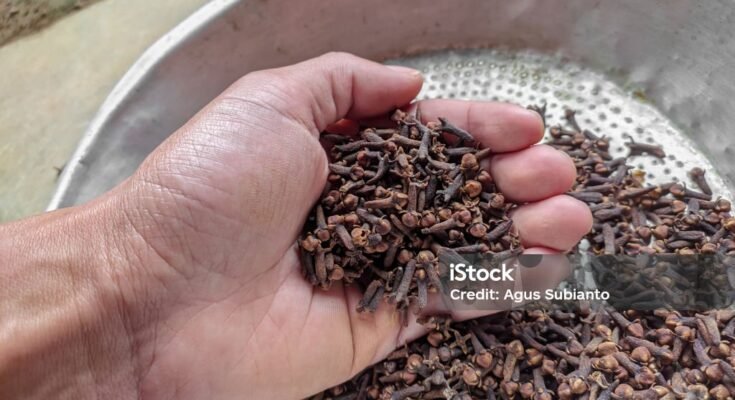Syzygium aromaticum, more commonly known as clove, is a fragrant spice that grows predominantly in the Maluku Islands of Indonesia. Historically, the spice has been held in high esteem for its unique aroma and flavor and for purportedly strong medicinal properties. The roles that clove has played in traditional remedies, modern medicine, and in cosmetic applications range from culinary uses to health benefits. The work presented here seeks to elucidate the vast benefits and collective usages of this remarkable plant.
Nutritional and medicinal benefits
The medicinal Properties of clove owe their origin to bioactive constituents present in it: the most important of which is eugenol and other compounds, which suggest antimicrobial, anti-inflammatory, and potent antioxidant activity. These qualities make clove a very versatile component in the development of natural remedies and pharmaceuticals.
1. Pain and inflammation relief
- Relief of toothache: Clove oil is popularly applied over the cavity to relive pain due to some analgesic effect.
- Clinical management of joint pain: Clove oil exhibits inflammation inhibitory activity; thus, it is a perfect remedy for arthritis and other inflammatory diseases.
- Headaches: Clove oil smoking gives relief from headaches and should be inhaled or used topically for tension headaches.
2. Antimicrobial and antifungal activities
Clove is effective against various pathogens.
- It kills germs in the mouth: It counters the action of Streptococcus mutans and other microbes involved in causing cavities and gum diseases; hence clove is well accustomed to use in mouthwashes and toothpaste.
- Fungal infections: Clove oil is useful in topical preparations that treat skin diseases such as athlete’s foot and candida overgrowth.
3. Digestive Health
- Relieves bloating, indigestion, and nausea: The commonly used clove tea remedy.
- Ulcer prevention: Some reports show it to be quite protective on the stomach lining, stimulating secretion of gastric mucus to avoid erosive ulcers.
4. The regulation of blood glucose
- It helps diabetics by increasing the sensitivity of insulin and regulating the blood sugar level.
- Studies showed that polyphenols of clove contribute to stabilizing sugar levels.
5. Rich in Antioxidants
- Fights oxidative stress: one clove is absolutely packed with antioxidants to neutralize free radicals, thus dealing with chronic illnesses like cancer and heart disease.
- Supports immune function: Clove is beneficial for one’s immune system and will stimulate the body in the battle with infections.
Culinary Uses
Clove is one spice essential to different world cuisines; it has a warm pungent taste and is aromatic.
- Spice blends: It is included in curry powders, garam masala, and Chinese five-spice to enhance flavor.
- Beverage: It is added to tea, hot ciders, and mulled wine for soothing spicy drinks.
- For baking and cooking: It enhances the flavor of baked goods such as gingerbread, pies, and cakes, as well as savory dishes such as stews and marinades.
- Pickling: Whole cloves in pickling recipes add that rich spicy taste to fruits and vegetables.
Agricultural Use
The potent aroma and antimicrobial properties of clove make it quite useful in agricultural and household applications, thus is favored widely.
Effective insecticide: Clove oil is extremely effective against termites and some fungi, while also being an effective repellant against other insects.
Natural preservative: Due to its antifungal and antibacterial effects, clove is sometimes used in preserving foods.
Air freshener: Clove is much loved in potpourris or natural air cleansers.
Warnings and Possible Side Effects
- Some research indicates clove oil can interact with certain drugs and medications.
- Always seek advice from a health professional before using essential oils.
- The reaction can be direct or indirect, especially in rare cases of allergic contact dermatitis or loss of consciousness after being sprinkled with the product.
- Tips: To be safe with herbal medicines and products, ask for medical advice, particularly in the case of children, the elderly, pregnant, or breastfeeding women, or those who have poor health or medical conditions.
Undoubtedly, clove can do wonderful things but must be used in moderation.
Allowing the body to be saturated with clove oil will lead to its toxicity and ultimately incur liver damage; skin irritation occurs from direct clove oil application upon sensitive areas. This sort of treatment requires dilution prior to use.
May interfere with some medications: Similar to coumarin derivatives, clove has also been reported to thin the blood, thereby calling for retrenchment in cases where anticoagulant treatment is already being used or if preparations for surgery are underway.
Conclusion
From Syzygium aromaticum, clove stands as a most diversified of herbs, with more than a hairbreadth tale of being valuable in health, cooking, cosmetics, and household uses. Having been admired for medicinal use over the past centuries, the exploration of more interesting therapeutic opportunities is still being conducted by modern scientists. Be it spicing foods, filling one with tranquility, or encountering common diseases, the clove exhibits its prowess fully when it comes down to sustaining health in general. However, moderate use is key to maximize the benefits while minimizing the side effects.
Clove will ever remain a classic example of nature’s beauty combined with healing prowess, altogether more interesting than the many cultures it nourished.



